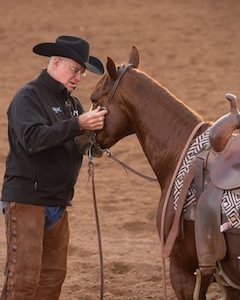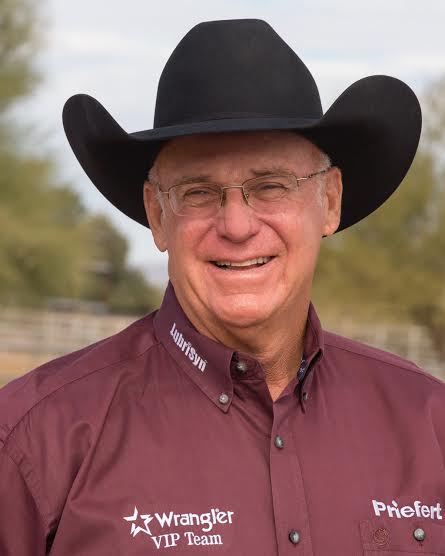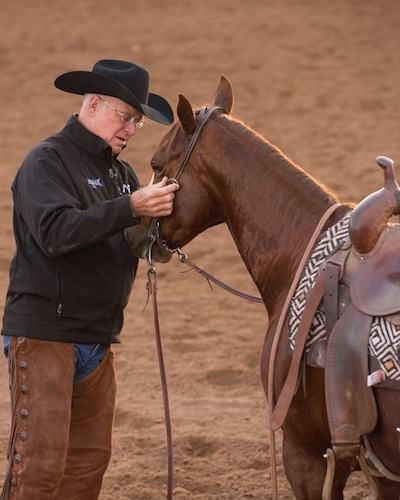Performance Horse Health and Well-being
by Al Dunning

Nothing is more important for my horse than his health and welfare. I want to share my appreciation for all the horse has done for me by taking the best possible care of him.
Most of the things I do to care for my horses are logical and relate to most animals and humans. These include proper exercise, nutrition, care and grooming, foot care, and meeting their emotional needs.
What steps do you take for the health of a horse that comes into your training program?
I start by evaluating their strength and condition. I feed top-quality alfalfa hay twice a day, with grass hay midday for continual grazing. I accompany that twice a day with the best grain pellet made by a company I know and trust and that my horses enjoy and clean up.
When a horse is new to my stable, I sometimes have to wean them onto our feeding program. With greater exercise you need to increase energy and fat in their diet. It is a little higher potency than what they have been used to! Through my evaluation process, I decide whether they need additional joint supplement, coat conditioner, worming, gastrointestinal potions, or any other medication.
In any hot or humid climate, it is also important that horses are fed supplemental electrolytes daily to keep from incurring anhidrosis.
How do you reduce health risks, especially for horses in training?
A big part of overall care for your horse is to evaluate him in his environment, whether it’s a pasture or a stall. Within a stall, you can tell a lot about a horse by how he eats. Is he eating everything? Is he picky? Is he leaving certain parts of his feed? Use these clues to understand your horse’s current state.
We have an equine dentist that specializes in the tooth care of our horses. He ensures there are no wolf teeth or sharp teeth that may prevent the horse from chewing his food properly or irritate him when riding.
You can also learn from looking at your horse’s manure to see how he is assimilating the feed and if he has any guttural problems.
Observing a horse’s attitude is what I key in on most. A horse that is overly irritated in a situation that doesn’t call for it will sometimes have ulcers or other major internal irritations that aren’t as visible to the less knowledgeable horseman. With things like this, it’s important to consult a quality veterinarian.
Are you a fan of chiropractic and other alternative medicine?
There are a lot of alternative feel-good methods that are used today for horse pain relief. I’ve used equine chiropractors over the years with success in certain cases, and other times not. A horse has big bones and strong muscles so they are harder to adjust than humans. Sometimes simply stretching a horse’s legs and neck will derive the same benefit as a chiropractor. I have certain equine chiropractors that I know have a good feel for the horse’s needs. They have helped me evaluate problem areas for my vet to delve into further.
Equine massage is another option that horse owners are using today. I personally have had massages and enjoy the heck out of them! So I must think that my horse is probably happy getting his massage, also. Whether it has a long-lasting benefit is up to you to determine.
I’ve had success with acupuncture on some of my horses. I’ve had acupuncture myself with success and have ridden the results of acupuncture on my horses. In my experience, it seems to help sore backs and hoof problems more than any other part of the horse.
Any final advice on keeping our horses healthy and happy?
Visually evaluate your horse, be sure that they are current with their vaccinations, that their feet are properly cared for, that they get a good mix of exercise, turn-out and down time and that the feed and nutrition program is balanced and fits the usage of your horse. Making sure your horse is curried, brushed and groomed properly not only helps the hair coat but also bonds you with your equine partner in a more physical manner.
Care for the horse’s well-being comes first in my training program. Using time-tested antidotes, implementing humane logic, and studying my horse’s needs benefits my winning percentage and keeps my horse happy for his entire career. Try it… you will like it.
Originally Published July 2017 Issue

Al Dunning of Scottsdale, Arizona, is one of the most respected horsemen in the industry. Al and his students have garnered 48 world and reserve world championships. He has held numerous national leadership positions and earned multiple honors including induction into the AzQHA Hall of Fame. His 50+ years of experience as a professional trainer has led him to produce books, DVDs, clinics, Team AD online mentoring, and AD Tack, selling all the tack he uses as well as his books and videos. Al’s ability to reach people comes from his love of horses and out of respect to the mentors in his own life. For more information, visit https://www.aldunning.com or www.aldunningsadtack.com.





